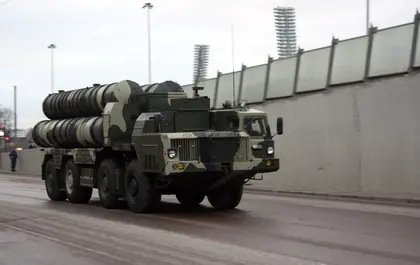A Ukrainian army spokesman said on Tuesday that Kyiv had carried out a series of attacks by air and ground forces against multiple sites on the Crimean Peninsula that had overcome Russian defenses and left a key Russian air defense facility damaged.
Spokesman for Ukraine’s naval operations, Dmitry Peltenchuk, said the strikes had targeted Russian air defense systems over “a large area” in Crimea and confirmed that key elements of that equipment had been damaged.
JOIN US ON TELEGRAM
Follow our coverage of the war on the @Kyivpost_official.
He did not offer details on weapons systems used by Ukrainian forces nor say where precisely the attacks had taken place.
Peltenchuk’s comments were the first official Kyiv comments on widespread reports in Ukrainian and Russian media on Monday that Ukrainian missiles had hit a Russian long-range S-300 anti-aircraft missile system air defense facility near the city of Yevpatoriya, on the west coast of the peninsula, putting it out of action and injuring at least 17 service personnel.
Russia’s Defense Ministry claimed air defense forces in Crimea had shot down eight Ukrainian Storm Shadow missiles attempting to enter in a Monday statement and other Russian official sources downplayed the scale of the Ukrainian attack.
On Tuesday, unofficial and even pro-Kremlin Russian sources told a substantially different story to Moscow’s official line.
The Ukrainian media site Unian, quoting the military information platform VChK-OGPU said the Kremlin statement was “invented,” and went on to confirm that the air defense facility near the village of Olenivka had been successfully hit. The post said that strikes had begun around 3 a.m. and had put the S-300 system out of action, damaged five military vehicles and wounded “more than” 20 service personnel, one severely, the article said.

EU Transfers €1.5 Bln Raised From Russian Assets for Ukraine
It went on to refer to posts on some Russian military social media sites, including that of Kremlin-sponsored “war correspondent” Boris Rozhin who claimed, without offering evidence, that the strike had been carried out using US ATACMS missiles. The first of these precision-guided ballistic missiles had been delivered to Ukraine in September and were first used on Oct. 17 in attacks against two Russian airfields during which a substantial number of attack and general-purpose helicopters had been destroyed and damaged.
It is believed that Ukraine is currently in possession of the ATACMS M39 variant which has a maximum range of 165 km. If this attack had used these missiles, it would be right at the limit of their capability. By Tuesday afternoon, there had been no public confirmation that ATACMS had in fact struck the Olenivka site.
Other Ukrainian systems capable of reaching that distance, aside from ATACMS missiles would be the domestically-manufactured Hrim missile or the Soviet-era Tochka-U missile. In spite of being used by Kyiv’s forces in the past, supplies of both of these weapons are reportedly extremely short.
Other unidentified Ukrainian long-range weapons supported by a special forces raid had taken out an early-warning radar and put a Russian S-400 air defense system out of action also deployed near to Olenivka on Aug. 23-25.
The attacks have drastically limited Russia’s ability to protect its air space in the western half the Black Sea. According to some analysts, the August attack on Olenivka made a series of devastating Ukrainian missile strikes against Sevastopol on Sept. 13 possible. This resulted in the destruction of a Russian navy amphibious assault warship and a missile submarine, putting three military dry docks out of use.
Crimea-based social media on Tuesday widely reported multiple missiles flying over Sevastopol on Monday, without being visibly intercepted, followed by at least four heavy explosions from the direction of the military port. Some locally-recorded images showed almost horizontal missile contrails overhead. Other accounts reported explosions and black smoke in the vicinity of Sevastopol’s military port with Russian military aircraft having been scrambled from the nearby Belbek airfield, apparently in an attempt to avoid incoming Ukrainian weapons.
Krym.Realii, a pro-Kiv military information platform, reported at least one Ukrainian missile had detonated close to machine shops and naval stores warehouses at the Sevastopol port, the main maintenance facility for Russia’s Black Sea Fleet. The report directly contradicted official statements by Kremlin-appointed officials in Sevastopol and Crimea that the Ukrainian attack on the military port failed completely.
Kyiv Post contacted representatives of ATESH, an umbrella group helping coordinate partisan activity in Crimea, about possible behind-the-lines assistance given to conventional Ukrainian army forces participating in the Olenivka and Sevastopol strikes on Monday.
The group declined to give details on ongoing activities, but confirmed its operators are continuously collecting intelligence on Russian military installations and troops occupying Crimea, and turning that information over to the Ukrainian military.
In a recent operation, an ATESH spokesman said, operatives entered and conducted reconnaissance inside the base of the 126th separate coastal defense brigade near Perevalne village, near the Crimea regional capital Simferopol and confirmed the exact location of unit facilities.
“Despite the huge number of military personnel, we managed to reconnoiter the area around the base. We carefully studied checkpoints, cells, patrols, barracks and equipment parks,” the statement said.
Open sources place the 126th at Perevalne, with forward elements reported to be deployed in the Kherson sector at 25 percent strength due to casualties.
You can also highlight the text and press Ctrl + Enter






